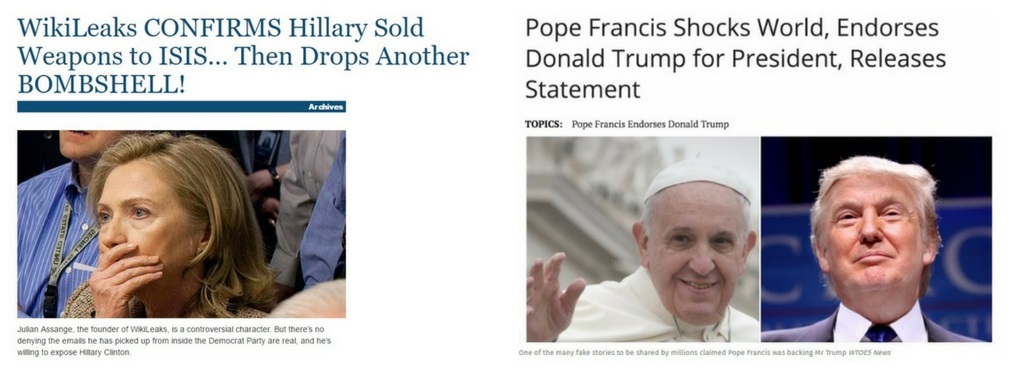There’s nothing new about fake news - it’s been used in warfare and politics for centuries - but with the invention of the Internet and social media the ability to disseminate fake news is in everyone’s pocket. Deputy Editor David Jordan looks at the possible consequences.

During the Second World War, Winston Churchill ordered the creation of an organisation charged with waging a propaganda war against Nazi Germany. It was called the Political Warfare Executive and its job was to spread fake news across Germany by dropping tens of thousands of forged German newspapers and leaflets over enemy lines that told harrowing tales of imminent defeat and disaster. A parallel campaign used a secret radio station in southern England to broadcast German language ‘news’ programmes designed to demoralise the enemy and hasten their surrender. The Germans in turn fought their own propaganda war against the UK with frequent radio broadcasts by traitor William Joyce, aka Lord Haw-Haw, who tried to convince the British public that their days were numbered. Joyce was hanged by the British for treason in 1946.
Using fake news in warfare is one thing, but using it in peace time as a political weapon or to simply make mischief, is in my opinion one of the greatest threats to civilised society and even world peace. Unlike mainstream media, which however imperfect, is identifiable and accountable for its actions, social media has given anyone, however irresponsible, the means to instantly disseminate ‘news’ anonymously and without any form of accountability or sanction to a worldwide audience. In the past, you needed a printing press and a squadron of aircraft, or at the very least a radio station, to broadcast propaganda, now all you need is a smartphone.
It is of course impossible to tell how much damage is caused by fake news and misinformation, but given the public’s apparent obsession with the likes of Facebook and Twitter and the millions of subscribers across the globe, it is likely to be considerable.
Two particularly note-worthy stories posted by bogus news agencies that appeared in the run up to the US election were that Pope Francis had endorsed Donald Trump and that Hillary Clinton had sold weapons to ISIS. The sad thing is the stories attracted over two million Facebook engagements over a three-month period, while at the same time, the New York Times’ best performing Facebook story managed only 370,000. Did those fake stories influence the result of the US election? We will never know.

For some reason the public seems to be remarkably tolerant of fake news and unsupported claims, even when the perpetrators are high-profile public figures who should know better. The slogan on the Vote Leave campaigner’s bus during the 2016 referendum falsely claiming that the UK was spending £350 million a week on EU membership and that they would use it to support the National Health Service, didn’t result in the politicians that invented it being publicly shamed and thrown out of office. Far from it. They won the public vote; Boris Johnson landed the plumb job of Foreign Secretary; and several others were given top roles in Theresa May’s new government. Meanwhile Nigel Farage was rewarded with his own talk-show on London’s LBC radio while he awaits a call from his friend Donald in Washington.
It seems the truth is becoming ever more elusive. The very first time President Trump’s new Press Secretary Sean Spicer faced the world’s media immediately after the inauguration, he claimed that the event had been attended by more people than Barrack
Obama’s in 2009 even though aerial photographs, live TV pictures and other evidence proved plainly otherwise. Later, senior White House aid Conway Kellyanne defended Spicer in a TV interview with CNN saying he was giving “alternative facts”. What the hell does that mean? And what does it say about future press statements from the Trump administration?
Getting back to the Internet, there is no doubt that its social networking platforms present a serious threat to us all when people abuse them, so you would think the organisations who run the sites would be doing all they could to combat the problem. Adam Mosseri, speaking on behalf of Facebook said, “We believe in giving people a voice and that we cannot become arbiters of truth ourselves, so we’re approaching this problem carefully. We’ve focused our efforts on the worst of the worst, on the clear hoaxes spread by spammers for their own gain, and on engaging both our community and third party organisations.”
Well, if that’s the case, how come Facebook allows spammers to post false obituaries of film stars and celebrities as sponsored links, for which they are presumably being paid? Any legitimate news agency that published rubbish like that would be sued for every penny they had.
The Internet has brought enormous benefits to the world of communications, but it has come at a price. Giving irresponsible organisations and people with antisocial or even criminal intentions the power to spread lies and propaganda with impunity to an often gullible public, is a recipe for chaos and catastrophe.
Unlike conventional weapons, fake news leaves no scars or burning buildings, but its effects can be every bit as devastating. Nazi propaganda merchant Joseph Goebbels loved it; thankfully the Internet hadn’t been invented!
Photos: Top: a newspaper produced by the Political Warfare Executive during World War II. Middle: the Hillary Clinton fake story as reported by politicalinsider.com in August 2016 and the story about the Pope allegedly endorsing Donald Trump, as
reproduced on the Independent newspaper’s website in a story about fake news.
Click here to see the next Editor's Pick